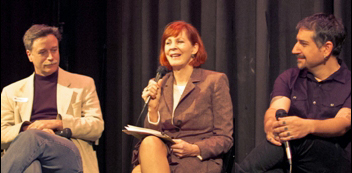 What should authors do when they get stuck and feel as though everything they write falls flat or gets rejected? Panelists attempted to answer that question while speaking to an overflow crowd at the March 29th Writing Show.
What should authors do when they get stuck and feel as though everything they write falls flat or gets rejected? Panelists attempted to answer that question while speaking to an overflow crowd at the March 29th Writing Show.
The innovative panel, “Rejections and Resilience: Fueling Creativity on an Empty Tank,” was moderated by VCU’s Dr. Rashida Gray. It featured best-selling fantasy author Michael J. Sullivan; writer, still-life artist, and psychiatrist Dr. Keyhill Sheorn; and award-winning artist and author of the 365 Skulls-a-Day project, Noah Scalin (pictured above, left to right).
Audience members were most interested in learning how to resurrect themselves and their writing during times of creative drought. While all of the panelists stressed the importance of joining writing groups, each mentioned what had helped him or her personally in the past.
Sullivan, rejected over 200 times, insisted on constant production. “Write a sentence a day,” he said, with the goal of growing one sentence into a paragraph, then a page, and with “a page a day you’ll get it done.” Scalin agreed that “the daily is accomplishable.”
Sullivan also pointed out that aspiring to write like a Pulitzer-Prize-winning author will only inhibit your creative juices. Striving for something less is not only doable, but it may lead to quality work. Sheorn reflected on her success in contacting artists whose work she liked and studying under them. One-on-one mentoring is a wonderful way for artists to hone their craft.
Scalin noted the benefit of using blogs and websites as advertising tools. The interactivity with an audience makes the author more accountable for regular output. However, he urged writers not to sit in front of a screen or manuscript if they feel stuck. “The least inspired place is where you do your work.” Instead, he told writers to go outside, take a walk, engage in conversation with others or use the Sullivan method and converse with yourself.
A comment about valuing the advice of readers over fellow writers drew applause from the audience. The take-home message was: listen to your audience and those who hold you accountable as artists before you listen to the devil on your shoulder.
— Christina Trimarco, JRW Intern

Back to Writing Show index page

